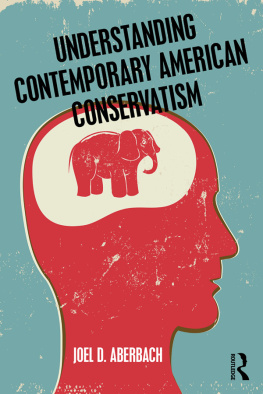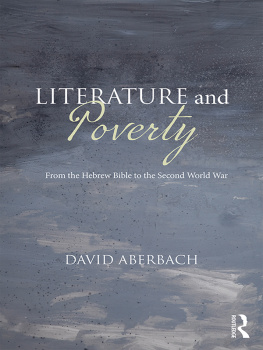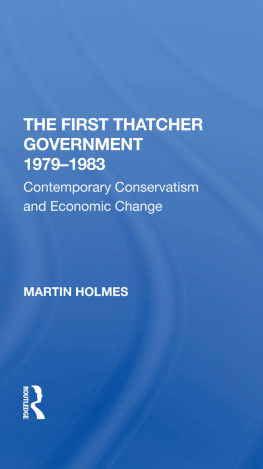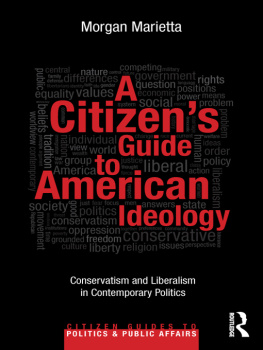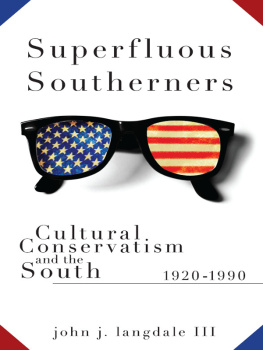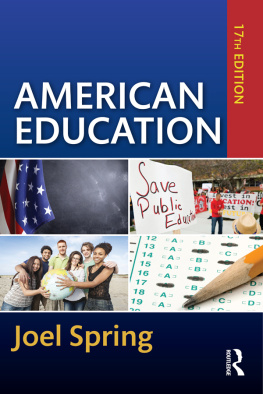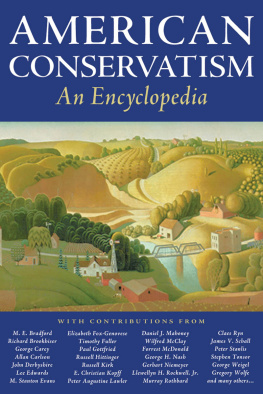Understanding Contemporary American Conservatism
Contemporary American conservatism a mlange of ideas, people, and organizations is difficult to define; even conservatives themselves are unable to agree about its essential meaning. Yet the conservative movement is well financed, exerts strong influence in the Republican Party, inspires followers throughout the land, and has spawned a network of think tanks and media outlets that are the envy of its competitors. It is a powerful political force with which to be reckoned. This book examines how that has come about and what contemporary conservatism signifies for US politics and policy. It looks at the recent history of conservatism in America as well as its antecedents in the UK, traces changes over time using American National Election Study data from 1972 to the present in what it means when people say they are conservatives, and assesses the prospects for American conservatism, both in the near-term electoral context and over the longer term as well.
Joel D. Aberbach is Distinguished Professor of Political Science and Public Policy, and Director of the Center for American Politics and Public Policy, at the University of California, Los Angeles.
Joel Aberbach has added measurably to his reputation as a highly-regarded political scientist with his brilliant new book on American political conservatism. Focusing on the vigorous and highly ideological Reaganism that has been in force over the last few decades, this illuminating book provides some clues to the sources of this brand of American conservatism. Aberbach also traces American conservatism from the early 20th Century to the mid-century moderate conservatism of President Dwight Eisenhower to the more muscular conservatism of Senator Barry Goldwater, and on to the form of conservatism that was introduced with Ronald Reagans election in 1981 and modified under George H.W. Bush, George W. Bush, and by Congress members and presidential hopefuls during the Obama years.
James A. Reichley, Author of The Life of the Parties: A History of American Political Parties
American conservatism today is a blend of philosophical positions and economic, political, and cultural beliefs and policy preferences that are viewed as conservative because they are promoted by groups that identify as conservative. Its arguments and ideas fuel the perceptions and intentions of Republicans, and distinguish conservatism from current American liberalism. This book methodically elaborates the issue stands of American conservatism and the ever-greater issue cleavages that distinguish it from American progressivism and the politics of Democrats. Almost 70 years ago, American political scientists called for more ideological coherence in the nations parties. Aberbach does us all a service by identifying the issue divisions that have developed as a consequence of realizing this academic wish.
John R. Petrocik, University of Missouri
Understanding Contemporary American Conservatism is a tour de force of ideological and behavioral change among the American public, and particularly on the conservative side of the political spectrum, by one of Americas foremost political scientists. Aberbachs clear prose and straightforward analytics produce a compelling storyline about the relationship between political ideology, party identification, and voting behavior across four decades. But more than just a focus on changing individual level relationships, Aberbach examines how institutions incentivize or discourage extremist ideological positions. Among other things, he notes the differences in conservatism in Britain and the US, and the varieties of conservatism that exist in the US. This is, simply put, a superb book for documenting and understanding the polarizing politics that has been with us for a while and which seems to be growing stronger.
Bert A. Rockman, Purdue University
Understanding Contemporary
American Conservatism
Joel D. Aberbach
Published 2017
by Routledge
711 Third Avenue, New York, NY 10017
and by Routledge
2 Park Square, Milton Park, Abingdon, Oxon, OX14 4RN
Routledge is an imprint of the Taylor & Francis Group, an informa business
2017 Taylor & Francis
The right of Joel D. Aberbach to be identified as author of this work has been asserted by him in accordance with sections 77 and 78 of the Copyright, Designs and Patents Act 1988.
All rights reserved. No part of this book may be reprinted or reproduced or utilised in any form or by any electronic, mechanical, or other means, now known or hereafter invented, including photocopying and recording, or in any information storage or retrieval system, without permission in writing from the publishers.
Trademark notice: Product or corporate names may be trademarks or registered trademarks, and are used only for identification and explanation without intent to infringe.
Library of Congress Cataloging in Publication Data
Names: Aberbach, Joel D., author.
Title: Understanding contemporary American conservatism / Joel D. Aberbach, University of California, Los Angeles.
Description: New York, NY : Routledge, [2017] | Includes index.
Identifiers: LCCN 2016011097| ISBN 9781138679320 (hardback) | ISBN 9781138679337 (pbk.) | ISBN 9781315563381 (ebook)
Subjects: LCSH: ConservatismUnited States. | United StatesPolitics and government.
Classification: LCC JC573.2.U6 A25 2017 | DDC 320.520973dc23
LC record available at https://lccn.loc.gov/2016011097
ISBN: 978-1-138-67932-0 (hbk)
ISBN: 978-1-138-67933-7 (pbk)
ISBN: 978-1-315-56338-1 (ebk)
Typeset in Sabon
by Swales & Willis Ltd, Exeter, Devon, UK
It is almost impossible these days to turn on the news and not hear something about conservatism. Candidates for office on the Republican side compete for the conservative mantle, debating who is the truer conservative and what issue position is the more legitimately conservative. Self-proclaimed conservatives in the Congress go so far as to threaten to close down the government unless they get their way, and the threat is not an idle one since they have done so in the past. A lively conservative media, the writings of conservative media figures and intellectuals, and the seemingly endless words of conservative politicians make notions of conservatism available to almost anyone who is willing to read or hear them.
My interest in the subject grows partly from the omnipresence and successes of conservatism in contemporary American politics and partly from a course I have taught with colleagues at UCLA for many years. The course is on America in the 1960s, and each time I teach it I think back to the heady days of the 1960s, and especially the period immediately after the landslide election of 1964, when to many the US seemed poised to enter a period marked not only by significant social change, but by a set of policy changes that completed the New Deal and would result in an era of liberal dominance.
Well, it didnt quite work out that way, and this book examines one aspect of why this is so; the emergence of a politically powerful conservatism that has penetrated deeply into popular politics in the United States. There are many ways one could look into this phenomenon. My own background led me to focus on analysis of some of the plentiful survey data available on the subject, but there are obviously many other ways one could go. The book contains some intellectual and political history, some comparisons of the views of various governmental elites with those of the general public, and some comparisons of the United States and the United Kingdom with respect to the ways in which their conservative parties have reacted to situations where they have not had electoral success, but the emphasis is on the attitudes and opinions of the US public and the transformation that has taken place in the structure of those attitudes and opinions over the major period covered by the survey data used in the book, 19722012.


